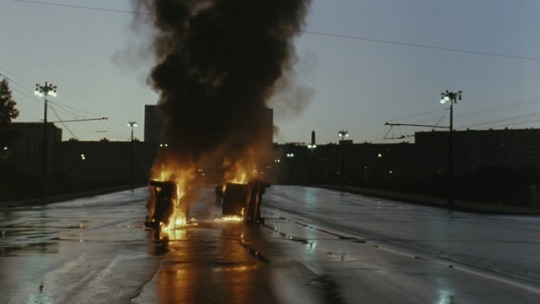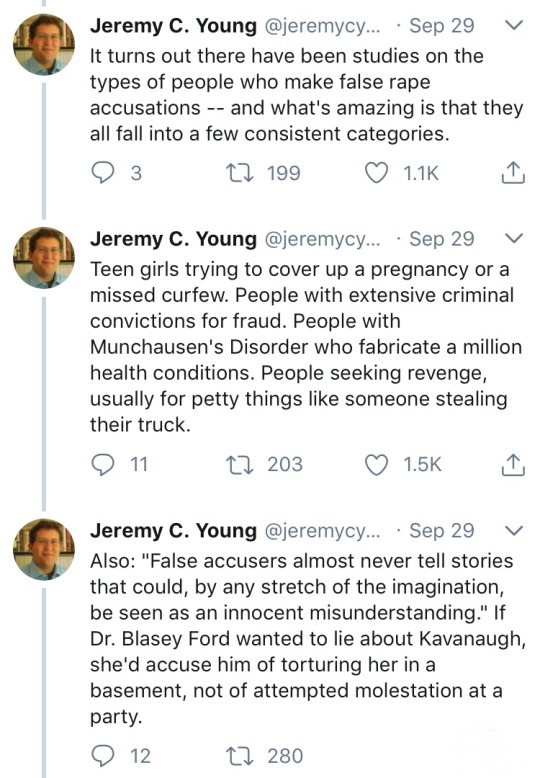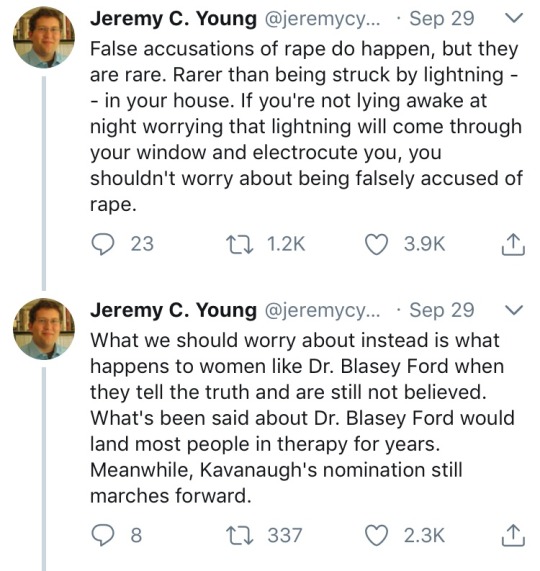Text
“We’re past the age of heroes and hero kings… Most of our lives are basically mundane and dull, and it’s up to the writer to find ways to make them interesting.”
— John Updike
189 notes
·
View notes
Text
“I am irritated by my own writing. I am like a violinist whose ear is true, but whose fingers refuse to reproduce precisely the sound he hears within.”
— Gustave Flaubert
608 notes
·
View notes
Photo
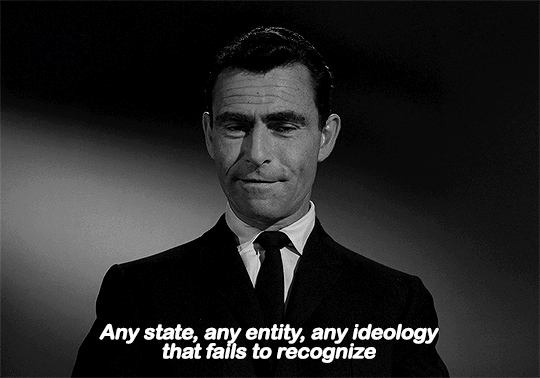

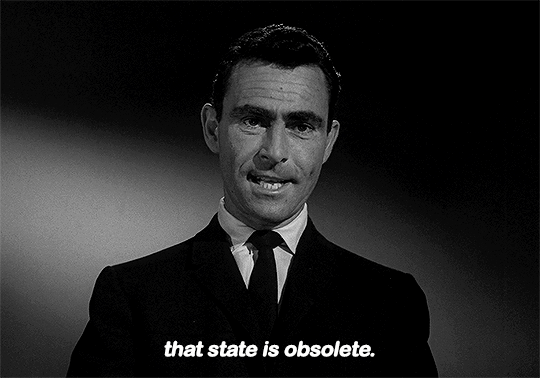
The Twilight Zone: The Obsolete Man (1961) dir. Elliot Silverstein
52K notes
·
View notes
Photo

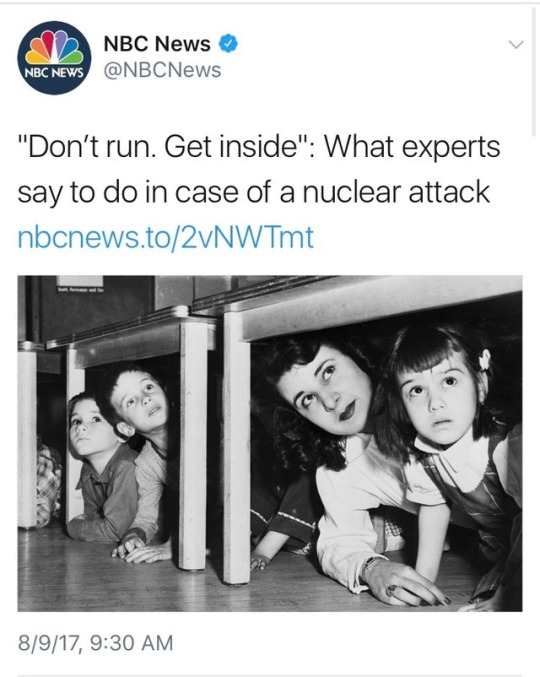

ladies and gentlemen we have officially reached the “in case a nuclear attack happens” phase……. [x]
372K notes
·
View notes
Text
Things to keep in mind when you write about stuff that happens in a dystopian desert wasteland
Most of a character’s clothing will be to protect them from the sun during the day. Even if it’s balls hot, you need to be protected from sun damage. No matter your skin tone, enough sun exposure WILL burn you.
They’ll also have to dress in layers to keep warm at night because the temp drops harshly in the desert when the sun goes down. I mean seriously, you could freeze to death. It’s cold at night.
Resting in the shade at midday is a good idea to both conserve energy and bodily fluids. Sweating has a cost, hydration.
A good 70% of what a character will be thinking about is water. Don’t drink enough, you die.
Anything is food if you’re hungry enough. That can go a lot of dark places but sadly it’s true.
Speaking of “everything is food” after long enough without anything to eat, your body will start eating itself.
Always toast the hair off tarantulas before eating them. The hairs are an irritant they use as a defense mechanism and they can brush off their abdomen hairs onto you if you mess with them.
Do. Not. Eat. Lizards. Raw. Lizards carry all sorts of parasites transmissible to humans. It will not be a good time. Cook them thoroughly.
Sand gets into everything. Everyone in the desert has a sandy buttcrack.
Screaming at the sun/moon occasionally is fine, just don’t go overboard and piss them off.
Head bobbing at monitor lizards is a pretty good stress reducer.
Avoid rocks that look kinda shaped like a human face. That’s probably not a rock.
Don’t talk to rocks.
Chatting up scorpions is fine from a distance.
Don’t sleep in the open.
This got weird fast.
7K notes
·
View notes
Text
“If you want to concentrate deeply on some problem, and especially some piece of writing or paper-work, you should acquire a cat. Alone with the cat in the room where you work, the cat will invariably get up on your desk and settle placidly under the desk lamp. The cat will settle down and be serene, with a serenity that passes all understanding. And the tranquility of the cat will gradually come to affect you, sitting there at your desk, so that all the excitable qualities that impede your concentration compose themselves and give your mind back the self-command it has lost. You need not watch the cat all the time. Its presence alone is enough. The effect of a cat on your concentration is remarkable, very mysterious.”
— Muriel Spark (b. 1 February 1918)
2K notes
·
View notes
Text
And speaking of Sophia Tolstoy, her diaries are just so depressing.
“I am to gratify his pleasure and nurse his child, I am a piece of household furniture, I am a woman. I try to suppress all human feelings. When the machine is working properly it heats the milk, knits a blanket, makes little requests and bustles about trying not to think […].“
She wrote this when she was 19, one year into her marriage to Leo and as she was pregnant with the first of his 13 children.
A few years later, when she was 25 or so:
“I am so often alone with my thoughts that the need to write in my diary comes quite naturally … Now I am well again and not pregnant—it terrifies me how often I have been in that condition. He said that for him being young meant “I can achieve anything”. For me […] reason tells me that there is nothing I either want or can do beyond nursing, eating, drinking, sleeping, and loving and caring for my husband and babies, all of which I know is happiness of a kind, but why do I feel so woeful all the time, and weep as I did yesterday? I am writing this now with the pleasantly exciting sense that nobody will ever read it, so I can be quite frank with myself […].“
During her 12th pregnancy she wrote about taking scalding baths and jumping from high pieces of furniture to try and miscarry. And at one point while reading her husband’s diary (which he told her to read) she found the sentence “There is no such thing as love, only the physical need for intercourse and the practical need for a life companion.” In her own diary she wrote “They ebb and flow like waves, these times when I realise how lonely I am and want only to cry…”
A few years before her husband’s death, she published a cycle of prose poems titled “Groans”, under the pseudonym “A Tired Woman”.
73K notes
·
View notes
Note
Any tips on how to stop starting your sentence with just the subject, (she, he, the dog, etc,), but avoid awkward sentences with dangling or misplaced modifiers, such as in your example: "The bullet was found by the police lodged in the wall," so you don't start your sentences with, the police, the police, they, they. Plus I personally hate a lot of sentences that begin with the object, not the subject, they are harder to edit and flow smoothly. If it's already in your tip book, what chapter?
It’s taken me a while to write this response because I considered several different ways of tackling the always-important but ever-slippery topic of sentence structure. It’s one of those things that feels simpler than it is once you dig down into it.
First off, a quick primer on sentence structure:
In English, the standard sentence structure is subject, then verb, then object:
I walked into the sun.
This is baked in to our linguistic infrastructure. Other languages put their subjects and verbs and objects in different orders. But in English, that’s what we do, and it’s why rearranging the words sounds weird or awkward or just plain wrong. I mean, you can say “Into the sun I walked,” but only if you’re Yoda.
That does not, however, mean that the only type of sentence you can write is a simple subject-verb sentence.
Remember way back when I posted that comma guide and I explained how when you have a phrase at the beginning of a sentence, before the subject, that you set it off with a comma? Well now you’re going to be happy you learned about them, because we’re going to be needing a whole lot of commas where we’re headed.
Things You Can Start Sentences With
Infinitive phrases: “to-verb-object” constructions. For example: “To learn more about this subject, visit your local library.” Or else, “To write a blog post about this, she had to do a lot of Googling.”
It’s a construction you don’t see as much in fiction, but it’s a tool at your disposal. It’s good enough for Hamlet!
Prepositional phrases: Prepositions are words that orient things in time and space in relation to one another - words like “over,” “under,” “after,” “before,” etc. Prepositional phrases are things like “After writing this sentence, she set down her pen” or “Over the meadow and through the woods, to grandmother’s house we go.”
Prepositional phrases are a good way to draw attention to where/how something is happening. Here’s a deeper guide into prepositional phrases: http://www.chompchomp.com/terms/prepositionalphrase.htm
Participial phrases: Aka, sentences that start with participles. Wtf is a participle? It’s a verb that’s being used as an adjective: “working woman” or “barking dog” or “burned out detective” or “tired woman in a coffee shop.”
You can start all sorts of sentences with participial phrases. See for example, “Tired of being poor, I decided to rob a bank” or “Threatened by the oncoming storm, we fled underground.” Read more about participles here: http://www.chompchomp.com/terms/participlephrase.htm
Epithets: There’s dangerous waters here because these get over-used and used badly, but you sure as shit can start a sentence with “the brown-haired man” or “the soccer star” or “the detective” instead of a character’s name.
If you want to draw attention to a particular quality, an epithet is a good place to start.
Conjunctions and Articles: Your elementary school teacher be damned, you absolutely can start a sentence with “and” or “but.” You can also start it with “however,” “therefore,” “otherwise,” and all manner of other conjunctions, both coordinating and subordinate. You have my permission.
You can also start with articles/pronouns. Things like, “That is a good point” or “This is an important problem.”
Okay but like how do I know when to use what sentence?
So when someone reads your sentence, they’re going to be imagining things in the order you say them, right? So you can use that knowledge to guide your writing. Using your words like a camera, imagine the flow of the scene and the information and how you want it to be told.
So for example, let’s say you’re conveying a scene about a character who is walking to the bus stop in the rain. You could write that in several different ways:
Jason walked to the bus stop, hunched over to avoid the rain.
Hunched over to avoid the rain, Jason walked to the bus stop.
As rain pelted down, Jason hunched over and walked to the bus stop.
Hunching over to avoid the rain, Jason walked to the bus stop.
Across rain-soaked streets, Jason made his way to the bus stop.
The rain-soaked traveler made his way to the bus stop.
That rainy night, Jason walked to the bus stop without an umbrella.
Etc.
Each sentence construction is equally correct and equally valid. The difference just comes down to what parts you want to focus on as a writer. Balancing the imagery, the word choice and the rhythm of the sentence is what brings it all to life.
373 notes
·
View notes
Text
Color Synonyms
White
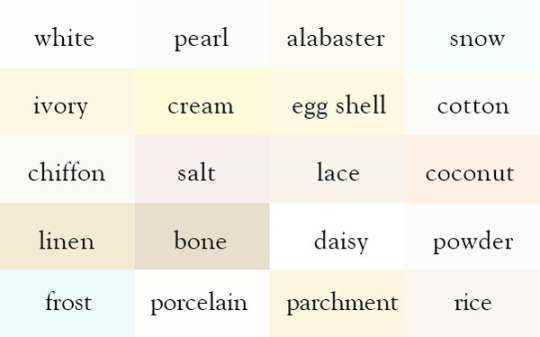
also: pale; blanched; sallow; pallid; waxen; spectral; translucent; albino;
Grey
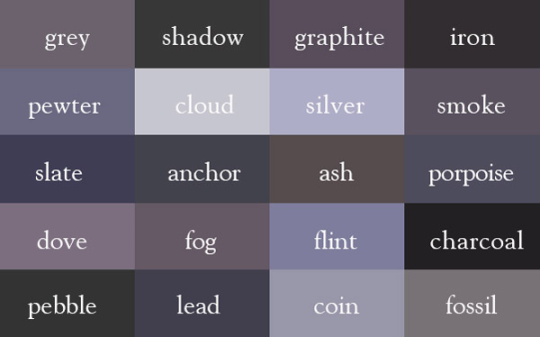
also: dust; stone; pepper;
Black

also: coal; slate; dusky; ebon; shadow; murky;
Tan
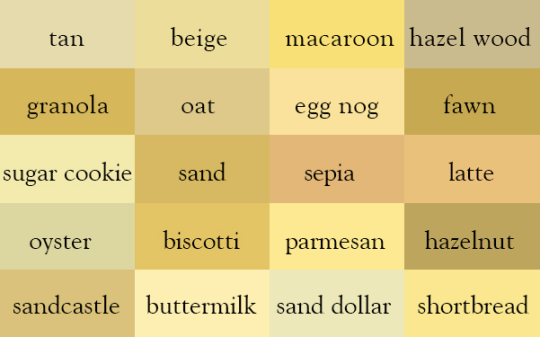
also: flesh; khaki; cream; tawny;
Brown
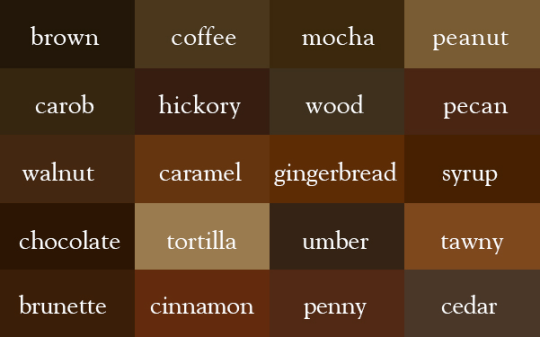
also: henna; russet; sepia; chestnut; cocoa; drab; bronze;
Red
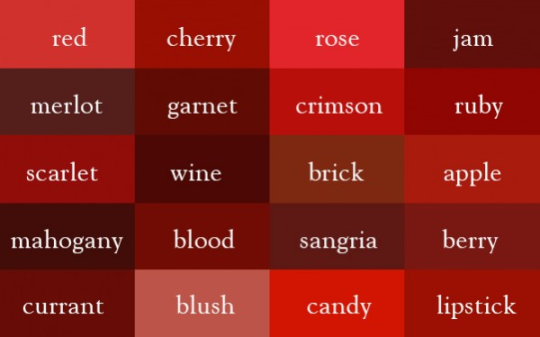
also: terracotta ; rouge; carmine; fire-engine; ruddy
Orange
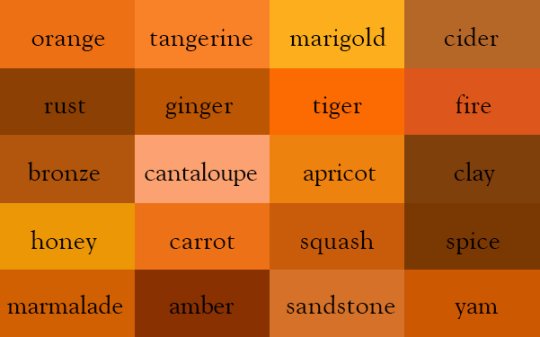
also: pumpkin ; rust ;
Yellow

also: sunny; amber; saffron; hay; straw; platinum;
Green
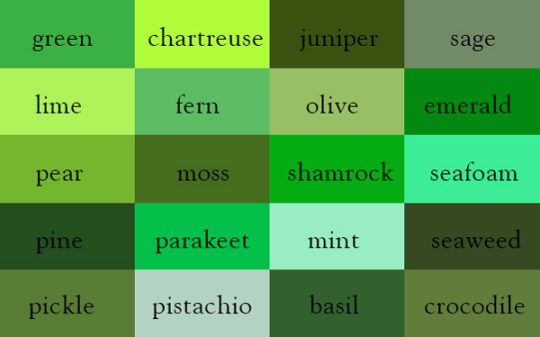
also: viridescent; grass; jade; forest;
Blue
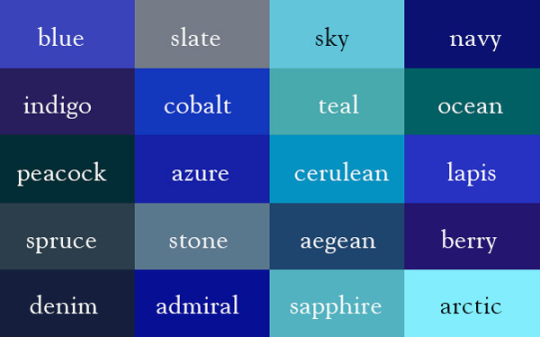
also: turquoise; cyan; ultramarine; royal; aqua; aquamarine;
Purple
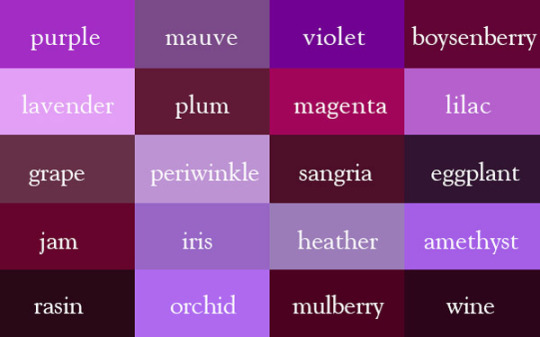
also: berry; amaranthine;
Pink

also: flushed; candy; cherry blossom; petal pink ;
—– source: http://ingridsundberg.com/
—–additional synonyms added by me
240K notes
·
View notes
Text
if you’re a small writeblr who wants more attention, remember that tags are your friend! i’ve heard that tags don’t matter on reblogs (i haven’t tested this), but tags on original posts absolutely do make a difference.
I use …
#writeblr and #writing for anything writing related
#amwriting, #writing, #original writing, and #creative writing for when you post excerpts/other things you’ve written
#fantasy, #science fiction, #horror, and etc. for the tagging the genre of the writing that you’ve posted
#writing tips, #writing help, and #writing advice for writing tips, writing help, and writing advice
Of course, there are probably many, many more, but these are the ones that I’ve used since I started my blog, and they haven’t let me down yet.
2K notes
·
View notes
Photo
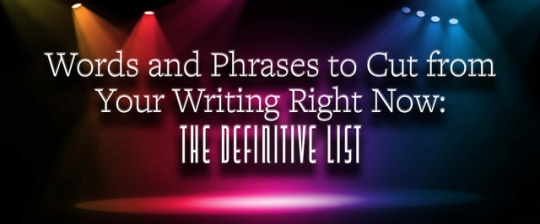
So, so many works I’ve read could be vastly improved with tightening and shaving of superfluous words. Wordiness is an easy stumbling block, as we’re used to how we talk. We’re used to how others (long ago) wrote. But times change, my friend, and so do expectations of the writer. We don’t get paid by the word in fiction. So show your smarts and say as much as you can with as much power as you can in as few words as possible.
Here are a few things you can cut without reserve to help shorten your story right now. And as you catch yourself using these words in your next draft, hit that backspace before you finish the sentence! It’s okay if you already have. You can go delete them now. No one will ever know.

Moment/Second/Minute
It’s so tempting. I am guilty of using this word like fertilizer in my first drafts. But most of the time, these words aren’t needed at all. They add nothing.
He sat down for a moment, sipping his coffee.
vs.
He sat down and sipped at his coffee.
But he only did it for a moment, you say!
He sat down for a moment, sipping his coffee. When the door opened a second later, he shot to his feet.
vs.
He sat down and sipped his coffee. The door opened, and before he could swallow his first sip, he shot to his feet.
I know, this is about making your writing more concise and my “right” example has more words than the first example. But what’s the difference? The words used in the second sentence are more tangible. They give a visual that “a second later” and “for a moment” don’t. And you could leave that part out, of course, if you’re really going for trimming word count. It doesn’t paint quite the same image, but “The door opened and he shot to his feet.” is a perfectly good sentence.
Suddenly/All of a sudden
You’ve heard this one, before, surely. These words are used…when? When you’re trying to portray suddenness. Surprise, perhaps. So why are you adding in extra words to slow down the pace?
She flipped on the TV and reclined in her chair. All of sudden, the TV flashed a bright light and the power went out.
vs.
She flipped on the TV and reclined in her chair.
The TV flashed once before the lights went dark. The power was out.
That sense of immediacy is felt when stuff just happens. So let it happen. If it’s rhythm you’re worried about, then find more useful words to create the rhythm. Notice that I didn’t just cut “All of a sudden” out of the sentence and leave it. I reworded it a bit to make it stronger.
Finally
It can be a useful word, but more often than not, it’s just taking up space.
Really/Very
Just…delete them.
To alter a Mark Twain quote:
“Substitute ’[fucking]’ every time you’re inclined to write ‘very;’ your editor will delete it and the writing will be just as it should be.”
But seriously, if you’re saying, “She was breathing very hard.” You could just cut the “very” and say, “She was breathing hard.” Or, even better, “She was panting.” Or, EVEN BETTER: “She panted.”
Himself/herself/myself/themselves
Reflexive nouns have a specific purpose, though they can still often be avoided. They fall into the category of “use only when it’s confusing otherwise.”
Correct:
He looked at himself in the mirror.
Better:
He looked in the mirror.
Incorrect:
She gave them to Andrew and myself before leaving.
Correct:
She gave them to Andrew and me before leaving.
Technically correct I guess:
I haven’t eaten lunch myself. (Intensive pronoun; aka waste of words)
Better:
I haven’t eaten lunch.
Intensive pronouns add emphasis, but that emphasis is negligible and often negated by the power of tightening your narrative.
That
You can likely cut 60% of your “that"s and your story will be unaffected. Sometimes, you do need to add a “that” here and there for clarification, but not always. And sometimes it’s just plain incorrect.
The jacket was the coolest one that he’d ever owned.
vs.
The jacket was the coolest one he’d ever owned.
In other cases, you might do well to substitute “that” with “which.” Though, if you’re doing this, make sure you do it properly. That change can often alter the meaning of your sentence. That can be for the better, though.
The vandalism that read “Bad Wolf” made Rose nervous.
vs.
The vandalism, which read “Bad Wolf,” made Rose nervous.
Do you see the difference? In the first sentence, the words are what make Rose nervous. In the second, the vandalism itself makes Rose nervous, and it happens to say “Bad Wolf.” In this case, if you’ve watched Doctor Who, then you know the first example is the correct one.
So when you’re sharing details using “that” or “which,” contemplate how important they are to meaning of the sentence to determine which type of clause you need to use.
Then
Or worse, “And then.”
It makes your writing sound a bit juvenile. Either cut it entirely, or substitute “and.”
She jumped into the pool, then hit her head on the bottom.
vs.
She jumped into the pool and hit her head on the bottom.
And then, after all that time, she fell asleep.
vs.
After all that time, she fell asleep.
Even
Sometime “even” can help emphasize a situation or behavior, but when it’s used in narrative improperly, it sounds childish and silly.
He couldn’t even breathe.
vs.
He couldn’t breathe.
Even with the new hair gel, his hair was terrible.
(This one is fine, though you could still cut that “even” if you really wanted to…)
Just
Just…Delete it.
Breathe/breath/exhale/inhale/sigh/nod/shrug
Another one I’m so guilty of. In my first drafts, I tend to talk about how a character is breathing, or when they’re sighing like nobody’s business. I know a lot of writers who are guilty of this, too. It’s a great tool to use scarcely. In intense moments, you can let your character take a final deep breath to calm themselves. When a character almost drowns, those first few sweet breaths are important. But you readers know that people breath all the time. And just because you need a beat in your dialogue doesn’t mean you need to remind your reader that the character is still breathing or moving.
Rather/quite/somewhat
She was rather tall. She was tall. He was quite idiotic. He was idiotic. They were somewhat snazzy. They were snazzy. Why do you need those words? Kill ‘em.
Start/begin
This is a great example of fluff.
She started to run toward the shop.
vs.
She ran toward the shop.
He began scolding them for their performance.
vs.
He scolded them for their performance.
There are obviously uses for this word, like anything. He started the car. Begin your tests! But when you’re using it to slow the action and the pace of your narrative, then consider heavily if you need it. You probably don’t.
In order to/in an attempt to
Phrases that add unneeded complications, cumbersome wording…kill 'em!
She bit down in an attempt to stop herself from screaming.
vs.
She bit down to stop herself from screaming.
Was able to
He was able to call.
vs.
He could call. OR He called.
This is one that isn’t inherently bad, but it can easily be overused and cutting it will help simplify your narrative.
Due to
Ugh. Are you trying to sound proper and stuffy? Because that’s a reason, I guess, to use this phrase…and yet it sounds like doodoo. (Yes. I’m an adult.) Rephrase. Use “Because of” or just avoid the need altogether.
We stopped due to traffic.
vs.
We stopped because of traffic.
OR (Strength of narrative!)
We stopped mid-highway. The parked cars went on beyond the curve of the road, out of sight.
Visibly/obviously/apparently/audibly
These are a sign of telling in your narrative when you should probably be showing.
She was visibly shaking. –> She shivered, hugging her upper arms.
He was obviously tired. –> He yawned and tripped on his own feet as he crossed the room.
They were apparently angry. –> They stomped and shouted, demanding attention.
She screamed audibly. (Really?) –> She screamed.
Don’t tell your readers what emotion a character is feeling. Instead, give a few clues that they can see/hear/feel the emotion too.
While
This word has lots of legitimate uses. However, if you’re using it poorly, then your narrative reads like an Early Reader’s book, and you (unless that’s what you’re writing) probably don’t want that.
“Get it together,” he said while flipping them off.
vs.
“Get it together,” he said, flipping them off.
Turned
One of the classics. So overused, my friends. It’s needed on occasion, but not nearly as often as we use it. Just cut it out.
They turned toward her as they spoke.
vs.
They gave her their full attention as they spoke. OR They looked into her eyes. OR (Nothing. Readers don’t have to be updated on every little movement.)
Saw/looked/regarded
UGH. Regarded:Looked::Mentioned:Said
And, like “said,” many, many instances of these words can be nixed.
She saw them run for the hills.
vs.
They ran for the hills.
This can be tricky, I know, when you’re writing in limited-third or first POV. It’s tempting to put every action directly through your POV character’s filter. But resist that temptation! There are times when it’s appropriate, occasionally, but it can be overdone so easily.
I looked at her and said, “Please.”
vs.
I said,“ Please.” OR. I took her hand. “Please.”
This example sides with the breathing and the turning. It’s often an unneeded update on the tiny movements of the characters. And, again, sometimes you need that beat or that little detail in an intense moment, but not often.
Said/replied/stated/spoke/mentioned/asked/commented/yelled/cried/shouted
I’m not here to tell you to cut all your dialogue tags (please don’t). I’m also going to the last person who insists you get rid of “said.” In fact, I’m in the “said is invisible” party of writing nerds and I think, if you’re going to use a standard tag, it should be “said” 90% of the time.
But aside from that, using as few dialogue tags as possible is a good thing. I’ll do a full post on this soon, but for now, be aware of how often you rely on these words in your dialogue and do your best not to overuse them. Use surrounding action and context to take some of the reliance off of these words.
To-Be in all its conjugated forms
If you’re using any of this list:
am, is, are, was, were, be, being, had been
Then check yo'self. Some tenses call for an auxiliary verb. Some types of sentence do, too, not doubt about it. But many don’t, and cutting to-be verbs when you can will help tighten your writing.
We were going to the store.
vs.
We went to the store.
Sounds were echoing through the chamber.
vs.
Sounds echoed through the chamber.
To-be verbs can also be an indicator of passive voice, though they aren’t always.
He was hit by the ball.
vs.
The ball hit him.
Last but not least, check all of your adverbs.
Chances are, if you’re using an adverb, you could be using a single strong verb instead and giving each sentence more punch.
He ran quickly. –> He sprinted.
I hit him hard. –> I socked him.
She spoke quietly. –> She whispered.
They ran into each other fast. –> They crashed.
So what am I supposed to do about this?
Take it to heart. Try not to let these words take over your brain as you write. Once your manuscript is finished, try this method:
Use Find and Replace. Replace any and all of the aforementioned words in ALL-CAPS. Now, if you’ve paid attention to my advice in using emphasis, then those all-caps will really stick out as you’re reading over your work and you can decide at each instance whether your usage is appropriate, or if it needs to be rewritten. As I did to this very old draft of mine from my first NaNoWriMo (in which I used every single word on this list, I’m sure).

When I used this method with my most recent WIP, I was able to cut my word count from 105k to 93k without cutting any content whatsoever. It takes a lot of work and it’s pretty tedious but the results are amazing!

It wouldn’t be the English language without exceptions, would it?
Now, there is actually an important time for intentionally using any or all of the words on this list. You know when that is?
When it fits the character’s voice. - More on this in my next post!
24K notes
·
View notes
Note
Any tips for NaNoWriMo? It’s my first time and I’m getting anxious
8 Tips to Get You Through NaNoWriMo:
I’m not a NaNo-er by any means. I’ve never seriously participated because I think there are a lot of pitfalls, which I’ve always been somewhat sassy vocal about. But, I do think there are ways you can get through it and avoid those pitfalls.
1. Plot your novel. This means make an outline– it can be as complicated or simple as you like, but you should have one. This includes things like world and character building. If you start at complete zero on November 1, you’re going to have a hard time producing anything that can carry a whole book over a month. Your end result will also be 10x more solid than pantsers. (And yes, I accept hate on this because I aM FIRMLY RIGHT FIGHT ME.)
2. Realize your draft will suck. The whole point of NaNoWriMo is to get your first draft out without thinking about it. Recognizing this from the start (this goes for all writers, but especially NaNo-ers) is a weight off.
You have to give yourself permission to suck in order to force yourself to write without inspiration. And when you expect yourself to write a book in a month, you’re going to have to force yourself to write without inspiration. That’s a skill that I very much admire NaNoWriMo for teaching.
3. Don’t kill yourself. If you don’t make your word count for a day, don’t beat yourself up. It happens, life gets in the way. I notice a lot of time ametuer writers participate, but even professional writers find it difficult to write an entire book in a month. Plan a day to try and catch up at the end of each week. You’ll learn at a much faster rate than most writers that guilt only slows you down.
4. Be prepared for extensive edits. This is especially true if you decide to pants it. NaNoWriMo winners tend to find themselves with a tangled knot at the end, and while editing is generally a long process, these novels tend to take a lot more effort to straighten out. So while you might get out a quick rough, you’re going to spend more time polishing overall. Which is fine, but being aware of this is important. Writing a book doesn’t end December 1st.
5. Commiserate with fellow writers. Seriously, to me, this is everything November is about. Talk to other writers. Learn, grow, and hone your craft. Most writers tend to be pretty active during this month, so take advantage of it when you get stuck! Find a buddy to help push you through. If you’re feeling stuck, troll the Nano forums/tags for others in the same spot as you are and talk until you find the spark you need to continue. If you have any IRL writer friends, definitely set up write in’s with them.
6. Take advantage of the tools you have. NaNoWriMo’s site has a lot of fun tools and badges for you to use– why not check them out? You can track your work through it and I’m pretty sure they offer a prize if you win? Seek help if you need it! There are many tools available online and my ask box is always open if you need some advice when you’re feeling stuck!
7. Don’t edit. Seriously, don’t get caught in this trap. This goes for first drafts in general (I mean, a little is okay provided you don’t get trapped in editing purgatory on you first chapter), but especially for NaNo-ers if you’re trying to hit that word goal. Some people find it helpful to start a new file for each chapter to avoid the temptation to scroll back to the very top or get stuck the second you open your document.
8. Set a routine. Give yourself breaks, set up rewards, keep your energy up. If you drive yourself into the ground the first week by writing non-stop, you’re gonna have a bad time. Figure out how many words you need to do everyday and set aside a time period to do it. Certainly, if you feel the urge, write more than your goal, but maybe don’t force yourself unless you’re behind. Sometimes having to stop halfway through a scene you’re really into will be enough to keep you going into the next session.
Make sure you also schedule breaks that are physically active and away from screens to help get the blood flowing. Reward yourself with your favorite show when you’re done, a hang out session with friends, or a bowl of ice-cream. Whatever keeps you motivated.
…………………………………….
Overall, NaNoWriMo can be a really positive experience.
If used right, writers can learn a lot of skills that they can use to fuel their writing the other 11 months of the year. Writing a book takes time, so even if you don’t “win,” don’t give up. Keep writing, keep applying those skills you’ve learned, and don’t stop that energy your cultivated in November just because it’s over.
You got this 👊💪
822 notes
·
View notes
Photo
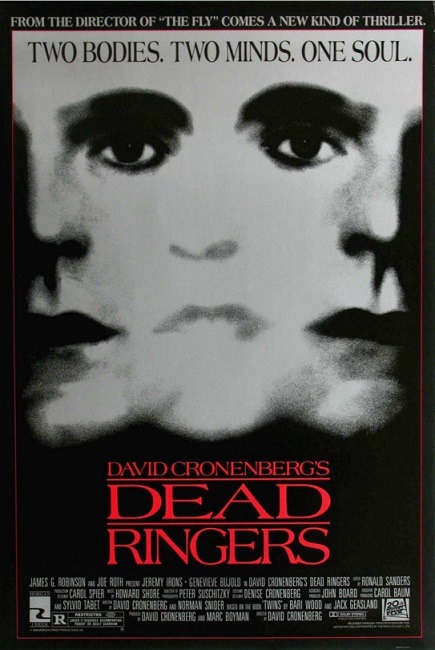
Jeremy Irons delivers his best work as DEAD RINGERS (’88) by Thomas Davant
The one set of twins I knew when I was younger always fascinated me. Here were two boys, born only minutes apart, identical in face yet immensely different in personality. It unnerved me then, and continues to do so now, when I imagine two organisms sharing the cramped chamber of the womb. On one hand it’s a beautiful thing, for surely it must get lonely in the quiet plasma of the amniotic fluid. On the other…it’s the first struggle. One emerges into the world first, and the second, even if arriving only minutes later, lives forever in the echo of the other.
“You haven’t done anything until I’ve done it too.”
The frosted world of the Mantle twins – it’s all glass and metal and very surgical. Their apartment sits high atop the streets, the lights from Toronto’s skyline twinkling outside the enormous windows. They’ve got fame and money and a patient list of the city’s wealthiest clientele. Elliott escorts the madams, makes his appearances and parades the Mantle name around town. He oozes confidence and flair. “Baby” brother Beverly is the tender of the two, a little more hesitant in all things, who prefers nights spent poring over anatomy textbooks in order to expand the field and forever gather more insight into the female body. It’s the perfect balance – what Elliot does, he fills his brother in on the details and then gives his brother the opportunity to try it out. This method is most effective as it deals with women. Suave Elliot reigns them in with wild passion, and quiet Beverly returns the next day. This system works out fine until an actress (Genevieve Bujold, absolutely fantastic in a role that embodies pain and wasted time) gets under Beverly’s skin and embeds herself in his heart.

“I’ve often thought there should be beauty contests for the insides of bodies.”
This is Cronenberg’s finest hour, bearing all his trademarks but weighted by a combination of unbeatable elements: the haunting score by Howard Shore, the masterful cinematography of Peter Suschitzky, and the powerhouse performance by Jeremy Irons playing both Mantle brothers. Cronenberg’s films have been accused of a coldness and detachment. His interest in the body is off-putting to some, and his characters always seem distanced. Once the unforgettable scenes of visceral mutilations and transformations are stripped away, his work has a beating, aching heart.

“This is unknown territory we’re moving into.”
Jeremy Irons gives the performance of his career. By the end of the film, you’re convinced there are two of him walking around. He separates the two with a discreet swoop of the hair and glasses behind which the bookish Beverly scans the floor. But at a certain point, it seems Cronenberg stops trying so hard to keep them distinct, and surely enough, they begin to merge in a way, succumbing to their unhinged desires leading to a finale that’s downright horrific. One of the most chilling scenes finds a drugged out Jeremy Irons clutching a piece of cake in his hand while another Jeremy Irons sits on the floor, crying out for ice cream.
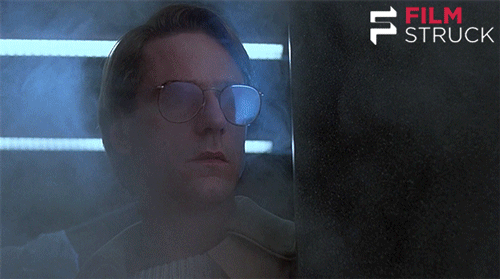
“They’re so different from us.”
Cronenberg and crew devised a way to contain both Irons on screen within the same shot, using body doubles, takes during which the actor would play Beverly, then repeat the takes as Elliot. The motion capture camera was programmed to repeat the same movement, which allowed for two tracking shots within an interior—one with Irons as Elliot, then one with Irons as Beverly walking through their office—to be merged seamlessly. The edition on FilmStruck gives you a wonderfully informative special feature which shows the takes and how they were combined in the editing room.

“Separation can be a terrifying thing.”
The story was based on the case of the Marcus twins, renowned Manhattan gynecologists whose behavior became erratic and strange before they stopped performing surgery altogether and disappeared. They were found days later, and well, to tell their story would be to give away the ending of this film. But this Cronenberg is more than visceral, and it delves into something greater than the “body horror” for which he’s known. It’s about the mind, about what a thin screen exists between normality and the vast expanse beyond sanity. In turning down the role of the Mantle twins, William Hurt famously declared that it was difficult enough to play one character, much less two. The twins share genetic identity, yet in the head it’s a different story. Maybe it’s the same for being a person – it’s already hard enough being one.
131 notes
·
View notes



